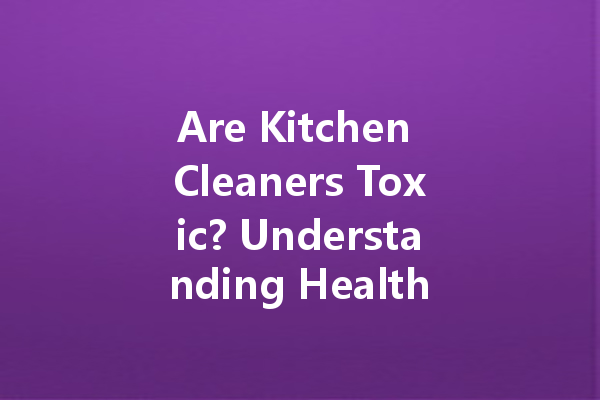Introduction
As we strive for cleanliness in our kitchens, most of us rely on various cleaning agents to keep our spaces tidy and sanitary. However, with increasing awareness of health and environmental issues, questions regarding the safety of these cleaners are becoming more prevalent. Are kitchen cleaners toxic? In this article, we will explore the potential dangers of common kitchen cleaning agents, their effects on health, and discuss healthier alternatives that can help you maintain a clean kitchen without compromising your well-being.
Understanding Toxicity in Kitchen Cleaners
Common Harmful Ingredients
Many commercial kitchen cleaners contain harsh chemicals such as ammonia, chlorine bleach, and phosphates. While effective at cutting through grease and grime, these substances can pose serious health risks. Exposure to these chemicals can lead to respiratory issues, skin irritation, and other allergic reactions, especially for those with sensitivities or pre-existing health conditions.
Environmental Concerns
Beyond personal health, the impact of these cleaners on the environment is also concerning. Many chemical cleaners contribute to water pollution and can harm aquatic life when they enter the water supply. In addition, the production and packaging of these cleaners often involve processes that contribute to carbon emissions, further impacting our planet.
Signs of Toxicity and Health Risks
Short-Term Effects
Immediate effects of exposure to toxic kitchen cleaners can include headaches, dizziness, and irritation of the eyes, skin, and respiratory system. If you’ve ever felt lightheaded or nauseous after cleaning your kitchen, it could be due to the fumes released by these potent substances.
Long-Term Issues
Prolonged exposure to toxic cleaners has been linked to more severe health complications, such as chronic respiratory diseases, hormone disruption, and even certain types of cancer. It is vital to be aware of the cleaning agents you are using and how they may be affecting your health in the long run.
Healthier Alternatives for Kitchen Cleaning
Natural Cleaners

One effective way to reduce the risks associated with toxic cleaners is to opt for natural alternatives. Ingredients like vinegar, baking soda, and lemon juice can work wonders for cleaning without the harsh chemicals. For example, a mixture of vinegar and water makes an excellent all-purpose cleaner, while baking soda can tackle tough stains and odors.
Eco-Friendly Products
There are also many eco-friendly cleaning products available on the market. Brands that focus on sustainability often use organic ingredients and recyclable packaging, making them a healthier choice for you and the environment. Look for products that are labeled “non-toxic,” “biodegradable,” and “free from harsh chemicals.”
DIY Solutions
Creating your own cleaning solutions can be both economical and safe. A simple DIY kitchen cleaner can be made using equal parts water and vinegar, combined with a few drops of essential oil for fragrance. This not only ensures you know exactly what’s in your cleaning solution but also allows you to customize scents that you enjoy.
Best Practices for Safe Kitchen Cleaning
Read Labels Carefully
When choosing cleaning products, always read the labels. Look for those that list non-toxic ingredients and avoid those with vague terms like “fragrance,” which can indicate the presence of harmful chemicals.
Ensure Proper Ventilation
If you’re using commercial cleaners, ensure your kitchen is well-ventilated. Open windows and doors, and use exhaust fans to help disperse fumes. This will help minimize your exposure and reduce the risk of respiratory issues.
Implement Safe Cleaning Techniques
When cleaning, try to use gloves to protect your skin from irritation, and consider wearing a mask if you are sensitive to chemicals. These small precautions can make a significant difference in your exposure to toxins while maintaining cleanliness in your kitchen.
Conclusion
The kitchen is often considered the heart of the home, and it’s essential to keep it clean for health and hygiene reasons. However, the question of whether kitchen cleaners are toxic is one that cannot be ignored. By understanding the potential dangers of common cleaning agents and taking steps to implement healthier alternatives, you can create a clean, safe environment for you and your family. Embrace natural cleaning solutions, invest in eco-friendly products, and always prioritize your health and the health of the planet.
